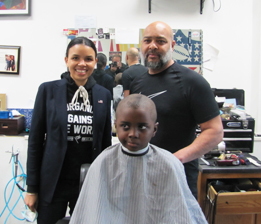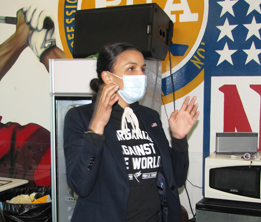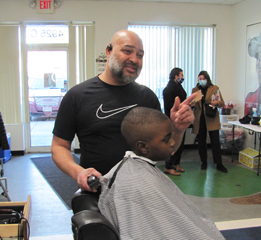
By Fletcher Word
Sojourner’s Truth Editor
Democratic senatorial candidate, Morgan Harper, toured Toledo small businesses on Saturday, January 8 and shared her vision about what’s wrong and right in Washington and what she intends to do about it when she is elected to fill the Senate seat currently held by retiring Republican Senator Rob Portman.
Harper, however, has a formidable task ahead of her. She is facing an uphill battle against Congressman Tim Ryan who declared his candidacy months before Harper and has amassed a bunch of money and a lot of local and national endorsements including from Hillary Clinton, Senator Sherrod Brown and most of the Ohio General Assembly Democrats. Just this week, State Rep. Emilia Sykes, House Minority Leader, endorsed Ryan.
Harper, during her visit to Toledo, focused on her vision – her determination to stay independent of corporate influence.

“Yes, there is a lot of focus on Democrats and Republicans,” she said in answer to a question in Steve’s Sport-N-Cuts from owner Steve Foster about the inability of those in both parties in Washington, D.C. to accomplish much. “The reality is that both parties, the majority of people in those positions ae about protecting people who have a lot of money – the large corporations that dominate the economy,” she continued.
Harper, an attorney and community organizer, declared her candidacy in August of last year. She had previously run for the U.S. House of Representatives in 2020 against Congresswoman Joyce Beatty in Ohio’s 3rd Congressional District. In the primary, she lost to the incumbent, who is now the chairwoman of the Congressional Black Caucus, by a 68 to 32 percent margin.
An Ohio native, Harper was adopted at the age of nine months and raised on Columbus east side. A scholarship helped her graduate from Tufts University before earning a masters degree from Princeton and a law degree from Stanford.
Harper returned to Ohio to serve as a clerk for the U.S. District Court for the Southern District of Ohio, worked as a paralegal at the Federal Trade Commission and served as a senior advisor at the Consumer Financial Protection Bureau during the Obama administration.

Recently she has been director of Policy & Advocacy at the American Economics Liberties Project, a non-profit group fighting to break up corporate monopolies. She is co-founder of Columbus Stand Up!, a grassroots community organization that has mobilized volunteers in central Ohio in response to the pandemic. Columbus Stand Up! Volunteers go door-to-door delivering masks, driving voters to the polls and transporting people to their COVID-19 vaccine appointments.
Harper is running for the U.S. Senate “to get political and economic power back on the side of the working people,” she said.
“This current economy is one of large multi-level corporations and they are allowed to do that because policies are set up to allow it,” she told her barbershop audience. “But by getting people elected, things change. People serving in Congress can change things; our leaders have failed us; our government has laid conditions for multilevel corporations to dominate.”

Harper’s platform includes all the elements of a progressive candidate: universal health care, universal childcare, equitable funding of public school districts, an end to inequities in the criminal justice system, pro-choice, workers’ rights, LGBTQ rights, etc.
Above all, Harper touts her independence – her grassroots fundraising, her pledge to stay away from lobbyist money.
“My opponent is one of the biggest takers of lobbyist money in the Congress,” she says of Congressman Tim Ryan.
Harper, a young (38 years old) candidate with no previous elective office experience on the local level is pursuing what would be her first political office on the national level. When asked why she is trying to start “at the top,” she replied that she feels a certain urgency was necessary and that service in Washington matched her experience.
“I don’t think that we have a lot of time to waste based on what’s happening right now in our country,” she said. “People are suffering. You need to have Washington-level resources in order to address it. That’s the place where I have experience. I’ve been in and out of Washington the last 15 years and I know how the place works.”
